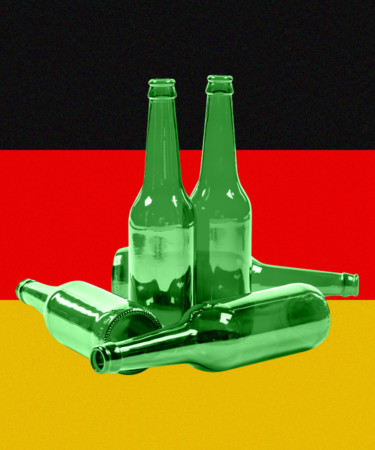Geopolitical conflicts, such as the war in Ukraine and upheaval from the Covid-19 pandemic, have caused inflation to skyrocket this year — and now, it’s coming for your favorite German beers. The war in Ukraine has caused a number of the country’s glass factories to cease operations, and the conflict has exacerbated energy costs across Europe, causing glass bottles produced elsewhere to cost upwards of 15 to 20 euro cents each — a record high.
Stefan Fritsche, CEO of one of the oldest and largest family-owned breweries in East Germany, Klosterbranuerei Neuzelle, has seen his costs of operations exponentially increase this year. His natural gas bill has shot up nearly 400 percent, his electricity bill 300 percent, and barley is more expensive for Fritsche now than it ever has been before. He explains that even with these pressing issues looming, the main struggle at hand is the severe shortage of beer bottles, a storm cloud covering all of Germany. Fritsche explains that the problem is “unprecedented,” and that “the price of bottles has exploded.”
While product shortages are nothing new in the post-Covid landscape, the shortage of beer bottles in Germany has nothing to do with the actual number of bottles in circulation. Germany has a unique returnable bottle system in which consumers pay a surcharge of eight euro cents for every bottle purchased, and the money is returned to them when they return the bottle to be recycled. According to the New York Times, the roughly 1,500 breweries in Germany have about 48 returnable bottles in circulation for every man, woman, and child in the country, amounting to over four billion bottles total. The problem however, is that not enough folks are returning their empties.
If there’s billions of empty bottles in circulation, where have they all gone? According to the NYT, many consumers tend to hold onto the bottles, stacking them up in free spaces in their homes until they are either out of space or in need of some extra change. Fritsche, whose brewery sells over 80 percent of its beer in bottles, calls this habit “deadly for small brewers.”
With summer approaching and bringing with it the return of hot weather and backyard barbecues, the German beer industry is taking new measures to encourage German beer lovers to return their empty bottles. The head of the German National Brewers’ Association, Holger Eichele, has taken to German radio and his own social media to urge Germans to return empty glass bottles. Fritsche has even played with the idea of raising the return fee of glass bottles to 15 euro cents.
Bild, Germany’s largest-circulating newspaper, recently ran an article exclaiming that “Germany is running out of beer,” and while the situation sounds scary, especially to those who love a good pint, Eichele explains that there is no imminent threat to German production levels. “We do not see any danger that beer production will have to be curtailed,” he explains. “To put it bluntly, supplies to consumers are secure.”
